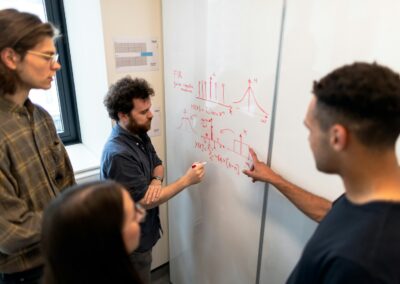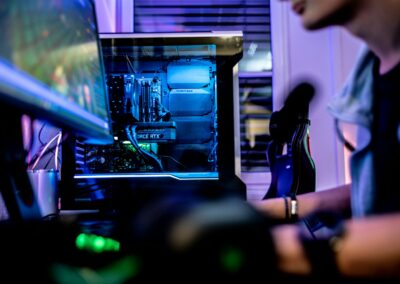Transforming Education with Gamification
Introduction to Gamified Collaborative Learning
Gamified collaborative learning is an innovative educational approach that leverages game mechanics to create engaging, interactive learning experiences that promote teamwork and problem-solving skills. This method has gained significant traction in modern educational settings, particularly in regions like Saudi Arabia and the UAE, where there is a strong emphasis on leveraging technology for educational advancement.
Gamification in education involves integrating elements such as points, badges, leaderboards, and challenges into learning activities to make them more engaging and enjoyable. When combined with collaborative learning, this approach encourages students to work together to achieve common goals, fostering a sense of teamwork and cooperation. The interactive nature of gamified learning also helps to develop critical thinking and problem-solving skills, essential for success in today’s fast-paced, technology-driven world.
In Saudi Arabia, the Vision 2030 initiative highlights the importance of modernizing education to prepare students for future challenges. Similarly, the UAE’s strategic focus on innovation and technology in education aims to create a learning environment that nurtures creativity and critical thinking. By adopting gamified collaborative learning, educational institutions in these regions can provide students with the skills and knowledge needed to thrive in the 21st century.
Enhancing Teamwork through Gamified Learning
One of the primary benefits of gamified collaborative learning is its ability to enhance teamwork among students. By incorporating game elements into group activities, educators can create a learning environment that encourages collaboration and cooperation. Students are motivated to work together to achieve shared objectives, fostering a sense of community and mutual support.
In Saudi Arabia, schools are using gamified learning platforms to promote teamwork and collaboration. For example, group projects and assignments are designed as interactive games where students earn points and rewards based on their collective performance. This approach not only makes learning more engaging but also helps students develop essential teamwork skills. By working together to solve problems and complete tasks, students learn to communicate effectively, manage conflicts, and support one another.
Similarly, in the UAE, educational institutions are integrating gamified collaborative learning into their curricula to enhance student engagement and teamwork. Universities and schools are using gamified platforms to create virtual learning environments where students can collaborate on projects and assignments. These platforms often include features such as chat rooms, forums, and collaborative tools that facilitate communication and cooperation among students. By providing opportunities for students to work together in a gamified setting, educators can help them develop the skills needed for successful teamwork in their future careers.
Furthermore, gamified collaborative learning can be particularly effective in professional development and corporate training. Businesses in Riyadh and Dubai are using gamified learning solutions to train employees in teamwork and problem-solving skills. By creating realistic simulations and interactive scenarios, companies can ensure that employees receive practical and effective training. This approach not only improves employee performance but also enhances motivation and job satisfaction.
Developing Problem-Solving Skills with Gamification
Gamified collaborative learning also plays a crucial role in developing problem-solving skills. By presenting students with challenging tasks and scenarios, gamified learning encourages them to think critically and devise creative solutions. This method helps students develop the ability to analyze problems, evaluate options, and make informed decisions.
In Saudi Arabia, educational institutions are using gamified learning to enhance problem-solving skills among students. Schools are incorporating game-based activities into their curricula that require students to solve complex problems and complete tasks. These activities often involve puzzles, simulations, and interactive scenarios that challenge students to think critically and creatively. By engaging in these activities, students develop the problem-solving skills needed to succeed in their academic and professional lives.
The UAE is also at the forefront of using gamified learning to promote problem-solving skills. Universities and schools are adopting gamified platforms that provide students with opportunities to tackle real-world problems in a virtual setting. These platforms often include features such as interactive simulations, case studies, and problem-solving challenges that require students to apply their knowledge and skills. By participating in these activities, students learn to approach problems systematically, think critically, and devise innovative solutions.
Additionally, gamified collaborative learning can be an effective tool for developing problem-solving skills in the workplace. Businesses in Riyadh and Dubai are using gamified learning solutions to train employees in critical thinking and problem-solving. By creating realistic simulations and interactive scenarios, companies can ensure that employees receive practical and effective training. This approach not only improves employee performance but also enhances motivation and job satisfaction.
Leadership and Management Skills for Implementing Gamified Learning
The successful implementation of gamified collaborative learning requires strong leadership and management skills. Leaders in educational institutions must possess a deep understanding of both the technological and pedagogical aspects of gamified learning. Effective leadership is crucial for driving innovation, fostering collaboration, and ensuring the successful adoption of gamified learning strategies.
Executive coaching services can play a vital role in developing the leadership skills needed to manage gamified learning projects effectively. Through personalized coaching, leaders can enhance their strategic thinking, decision-making, and change management abilities. This enables them to lead their organizations with confidence and resilience, ensuring that gamified learning initiatives achieve their objectives and drive educational success.
In addition to leadership skills, effective project management is essential for the successful implementation of gamified learning. Project managers must oversee the planning, execution, and monitoring of gamified learning projects to ensure they are completed on time, within budget, and to the desired quality standards. By investing in leadership and project management training, educational institutions in Saudi Arabia and the UAE can enhance their ability to manage complex projects and navigate periods of change successfully.
Business Success through Gamified Learning
The adoption of gamified collaborative learning offers significant benefits for business success in various industries. By enhancing the efficiency, adaptability, and intelligence of training programs, gamified learning enables businesses to optimize their processes and improve decision-making. This technology can be applied across multiple sectors, providing a competitive advantage in the market.
In Saudi Arabia, businesses can leverage gamified learning to enhance operational efficiency, streamline processes, and drive innovation. By integrating advanced learning solutions into their training strategies, companies can achieve greater productivity and profitability, leading to long-term success. Gamified learning aligns with the Vision 2030 initiative, supporting the country’s goal of becoming a leading global hub for technology and innovation.
Similarly, in the UAE, the integration of gamified learning can transform business operations and drive growth. Companies in Dubai and other parts of the UAE can use this technology to develop innovative products, improve customer service, and optimize operational efficiency. By adopting gamified learning systems, businesses can stay ahead of the competition and achieve sustainable success in the digital economy.
Conclusion: The Future of Gamified Collaborative Learning
In conclusion, the effectiveness of gamified collaborative learning in achieving educational outcomes and improving student motivation is evident through the various applications and benefits discussed. By leveraging game mechanics and AI, educators can create engaging and interactive learning experiences that enhance student engagement, knowledge retention, and skill development. Effective leadership and project management are essential for the successful implementation of these technologies, ensuring that educational institutions and organizations in Saudi Arabia and the UAE can harness their full potential and achieve long-term success. As these regions continue to embrace digital transformation, the adoption of gamified collaborative learning will play a pivotal role in driving innovation and improving educational experiences for all students.
—
#GamifiedLearning #CollaborativeLearning #Teamwork #ProblemSolving #EducationalTechnology #ArtificialIntelligence #SaudiArabia #UAE #Riyadh #Dubai #BusinessSuccess #LeadershipSkills #ProjectManagement























